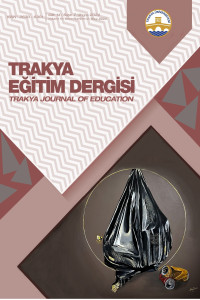Mikro Öğretim Destekli Öğretmenlik Uygulaması Dersinin Sosyal Bilgiler Öğretmeni Adaylarının Mesleğine Yönelik Tutumlarına Etkisi
Öz
Mikro öğretim, sınıf ortamındaki beklenmeyen durumları etkili bir şekilde kontrol etme imkânı tanıdığından öğretmen adaylarının güven içerisinde deneyim kazanması için oldukça verimli bir yöntemdir. Bu araştırmanın temel amacı, mikro öğretim destekli Öğretmenlik Uygulaması (ÖU) dersinin Sosyal Bilgiler öğretmeni adaylarının mesleğine yönelik tutumlarını nasıl etkilediğini ortaya koymaktır. Bu amaç doğrultusunda karma yöntem modellerinden açıklayıcı ardışık desen kullanılmıştır. Araştırmanın nicel boyutunda öntest-sontest kontrol gruplu yarı deneysel model, nitel boyutunda ise olgubilim (fenomenoloji) desenleri kullanılmıştır. Araştırmaya uygun örnekleme yöntemiyle belirlenen 22’si kontrol 21’i ise deney grubu olmak üzere toplamda 43 öğretmen adayı katılmıştır. Çalışmanın nicel basamağında “Öğretmenlik Mesleğine Yönelik Tutum Ölçeği” kullanılmıştır. Çalışmanın nitel basamağında ise veriler yarı yapılandırılmış görüşme formu ile toplanmıştır. Deney ve kontrol grup puanlarının karşılaştırılması amacıyla Mann Whitney U testi kullanılmıştır. Deney ve kontrol gruplarının ön ve son test puanları arasında anlamlı bir fark olup olmadığına ise Wilcoxon işaretli sıralar testi ile bakılmıştır. Nitel veriler ise betimsel analiz yöntemiyle çözümlenmiştir. Araştırmanın nicel bulguları incelendiğinde katılımcıların Öğretmenlik Mesleğine Yönelik Tutum Ölçeğinin ön test ve son test puanları arasında anlamlı fark bulunmamıştır. Ancak yapılan görüşmeler sonucu elde edilen bulgularda mikro öğretim destekli ÖU dersinin olumlu tutumlar geliştirme açısından öğretmen adaylarına fayda sağladığı tespit edilmiştir.
Anahtar Kelimeler
Mikro Öğretim Sosyal Bilgiler Öğretmenlik Uygulaması Tutum Karma Yöntem
Kaynakça
- Alıncak, F. (2016). Mikro öğretim uygulamalarının öğretim becerilerine etkisine ilişkin beden eğitimi ve spor öğretmeni adaylarının görüşleri (Yayınlanmamış doktora tezi). Kırıkkale Üniversitesi, Sağlık Bilimleri Enstitüsü, Kırıkkale.
- Allen, D. W., & Eve, A. W. (1968). Microteaching. Theory into Practice, 7(5), 181–185. doi:10.1080/00405846809542153 Arsal, Z. (2014). Microteaching and pre-service teachers’ sense of self-efficacy in teaching. European Journal of Teacher Education, 37(4), 453–464. doi:10.1080/02619768.2014.912627
- Atav, E., Kunduz, N., & Seçken, N. (2014). Biyoloji eğitiminde mikro öğretim uygulamalarına dair öğretmen adaylarının görüşleri. Hacettepe Üniversitesi Eğitim Fakültesi Dergisi, 29(4), 1–15.
- Aykaç, N. (2018). Öğretim İlke ve Yöntemleri. Ankara: Pegem Akademi Yayıncılık.
- Bakır, S. (2014). The effect of microteaching on the teaching skills of pre-service science teachers. Journal of Baltic Science Education, 13(6), 789–801. doi:10.33225/jbse/14.13.789
THE EFFECT OF MICROTEACHING SUPPORTED TEACHING PRACTICE COURSE ON PROSPECTIVE SOCIAL STUDIES TEACHERS' ATTITUDES TOWARD THEIR PROFESSION
Öz
Micro-teaching is a highly efficient method for pre-service teachers to gain experience in confidence as it allows them to control unexpected situations in the classroom environment effectively. The main purpose of this study is to reveal how microteaching-supported teaching practicum courses affect pre-service social studies teachers' attitudes toward their profession. For this purpose, explanatory sequential design from mixed method models was used. A quasi-experimental model with a pretest-posttest control group was used in the quantitative dimension of the study, and phenomenology design was used in the qualitative dimension. A total of 43 pre-service teachers, 22 in the control group and 21 in the experimental group participated in the study. In the quantitative stage of the study, "Attitude Scale Towards Teaching Profession" was used. In the qualitative stage of the study, data were collected with a semi-structured interview form. Mann-Whitney U test was used to compare the scores of the experimental and control groups. The Wilcoxon signed-rank test was used to determine whether there was a significant difference between the pre and post-test scores of the experimental and control groups. Qualitative data were analyzed by descriptive analysis method. When the quantitative findings of the study were examined, no significant difference was found between the pre-test and post-test scores of the participants' Attitude Towards Teaching Profession Scale. However, the findings obtained from the interviews revealed that the micro-teaching supported teaching practice course was beneficial for pre-service teachers in terms of developing positive attitudes.
Anahtar Kelimeler
Microteaching Social studies Teaching practice Attitude Mixed Method
Kaynakça
- Alıncak, F. (2016). Mikro öğretim uygulamalarının öğretim becerilerine etkisine ilişkin beden eğitimi ve spor öğretmeni adaylarının görüşleri (Yayınlanmamış doktora tezi). Kırıkkale Üniversitesi, Sağlık Bilimleri Enstitüsü, Kırıkkale.
- Allen, D. W., & Eve, A. W. (1968). Microteaching. Theory into Practice, 7(5), 181–185. doi:10.1080/00405846809542153 Arsal, Z. (2014). Microteaching and pre-service teachers’ sense of self-efficacy in teaching. European Journal of Teacher Education, 37(4), 453–464. doi:10.1080/02619768.2014.912627
- Atav, E., Kunduz, N., & Seçken, N. (2014). Biyoloji eğitiminde mikro öğretim uygulamalarına dair öğretmen adaylarının görüşleri. Hacettepe Üniversitesi Eğitim Fakültesi Dergisi, 29(4), 1–15.
- Aykaç, N. (2018). Öğretim İlke ve Yöntemleri. Ankara: Pegem Akademi Yayıncılık.
- Bakır, S. (2014). The effect of microteaching on the teaching skills of pre-service science teachers. Journal of Baltic Science Education, 13(6), 789–801. doi:10.33225/jbse/14.13.789
Ayrıntılar
| Birincil Dil | Türkçe |
|---|---|
| Konular | Öğretmen Eğitimi ve Eğitimcilerin Mesleki Gelişimi |
| Bölüm | Araştırma Makalesi |
| Yazarlar | |
| Erken Görünüm Tarihi | 25 Mayıs 2024 |
| Yayımlanma Tarihi | 30 Mayıs 2024 |
| Gönderilme Tarihi | 15 Şubat 2024 |
| Kabul Tarihi | 29 Nisan 2024 |
| Yayımlandığı Sayı | Yıl 2024 Cilt: 14 Sayı: 2 |

